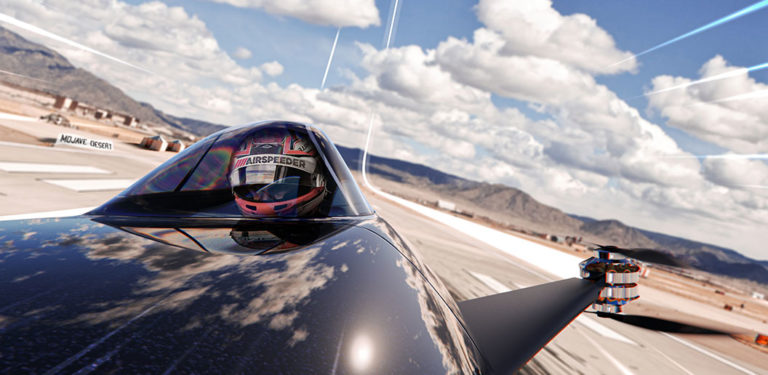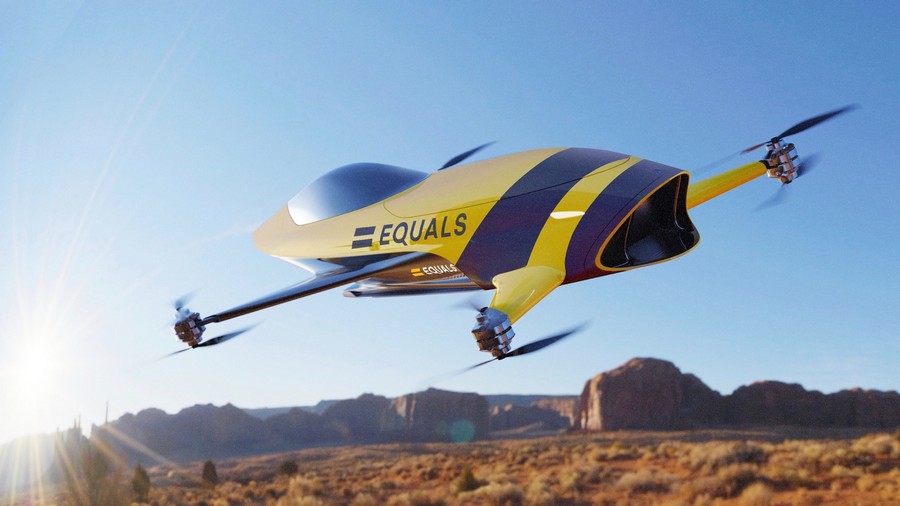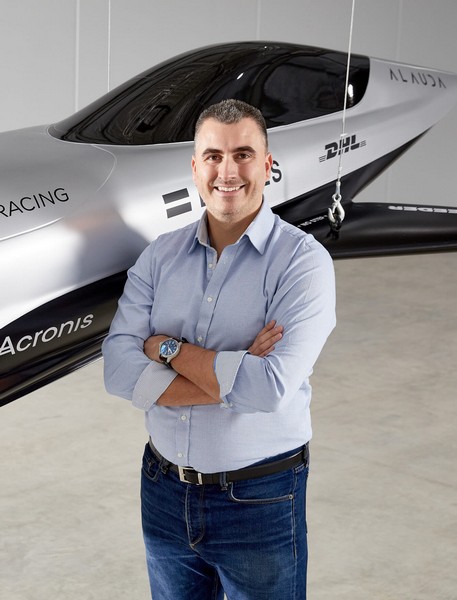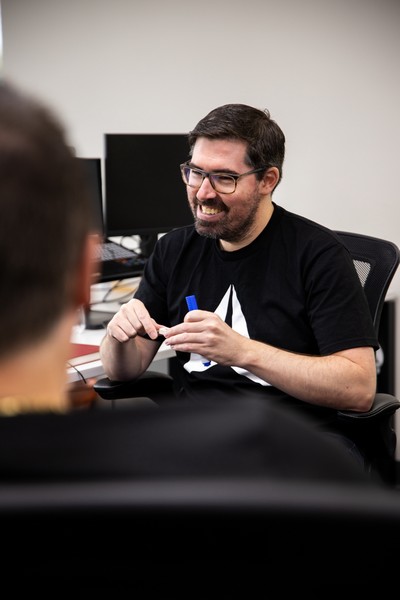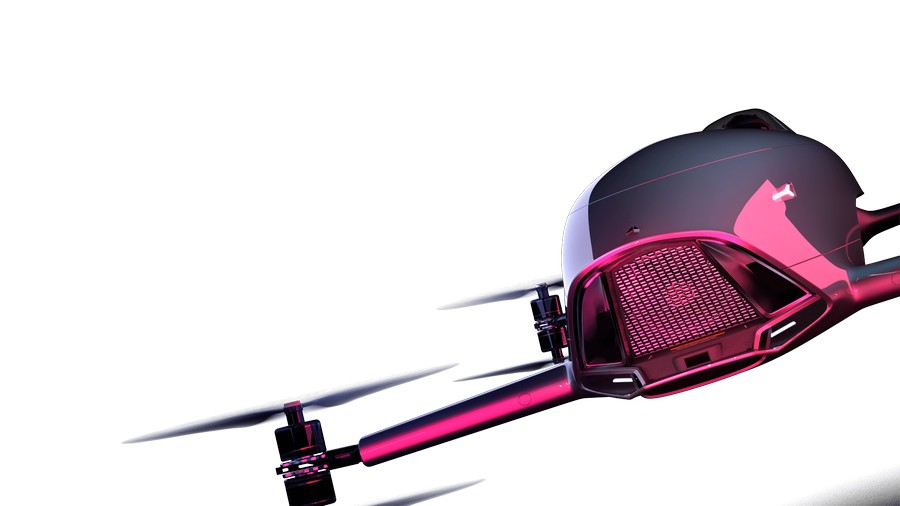Matthew Pearson, Founder of Airspeeder and Alauda Aeronautics recently revealed the world’s first fully functioning electric flying racing car.
The Airspeeder Mk3, is a full-sized remotely-operated electric vertical take-off and landing vehicle (eVTOL). It will compete in an upcoming remotely-piloted Airspeeder racing series that will stand as a technical test-bed and feeder series to a manned racing series in 2022. The unveiling of the vehicle represents the realisation of more than three years development work to create a sport that will accelerate a new clean-air aerial mobility revolution.
A full grid of Mk3 electric flying race-craft is currently being manufactured at Airspeeder and Alauda’s technical HQ in Adelaide, South Australia. More than 10 identical racing vehicles will be produced and supplied to teams in 2021. The craft is being developed and manufactured by a team drawn from leading names in aerospace, automotive and motorsport technology including; Mclaren, Babcock Aviation, Boeing, Jaguar Land Rover, Rolls-Royce and Brabham.
The Airspeeder Mk3 racing series will be announced in the coming months. These remotely-piloted races will present to the world for the first time close-quarter flying circuit racing at speeds of more than 120km/h.
The initial Mk3 races will provide vital information on vehicle dynamics, performance, safety and powertrain technology that will inform the final development of the manned Mk4 Airspeeder vehicle. Racing will play a vital role in hastening the arrival of eVTOL technologies which promise to revolutionise urban passenger mobility, logistics and even remote medical transport. Both the remotely piloted Mk3 programme and manned Airspeeder Mk4 flying cars will provide a safe environment from where key innovations around safety, noise and batteries can be refined and fed into the wider development of an industry predicted by Morgan Stanley to be worth $1.5 trillion by 2050.
The Airspeeder Mk3 represents a giant technical leap forward in the development of the world’s first racing series for electric flying cars.
The 2021 flying electric race vehicles will be operated by expert remote operators on the ground. The remote operators will have a suite of technologies and engineering elements never before seen on an eVTOL craft, and include LiDAR and Radar collision avoidance systems that create a ‘virtual forcefield’ around the craft to ensure close but ultimately safe racing.
The Mk3 features a carbon fibre frame and fuselage chosen for its strength, stiffness and lightweight properties, which ensures maneuverability, performance and efficiency. The carbon fibre frame and fuselage adds a vital mechanical layer of safety, which will be further enhanced by a full carbon fibre monocoque body to be introduced on the Mk4 vehicle.
The Mk3 speeders are laid-out in an ‘octocopter X formation’. This provides significant advantages to pilots in terms of maneuverability and stability. Flying at speeds in excess of 120 Km\h, the pilot will be able to make the same sharp hairpin style turns as a Formula 1 car but with the added third dimension of being able to move vertically. The octocopter configuration also adds an important measure of vehicle redundancy and will ensure the craft can safely land and remain in control should a rotor or battery system fail.
Airspeeder Grand Prix’s will include rapid pit stops. To facilitate this, Alauda’s engineers have developed an innovative ‘slide and lock’ system for the rapid removal and replacement of batteries when on the ground, this technology debuts on the Mk3. A strategic layer is added to the sport with this approach as teams will be able to adapt battery strategy depending on the dynamic requirements of that particular section of the race. For example, for courses requiring more maneuverability but less straight line speed, a lighter battery pack can be easily selected to deliver more maneuverability at the cost of raw power or endurance.
2020 saw an extraordinary year of progress for Airpseeder and Alauda. The unveiling of the Mk3 craft represented a landmark moment in the development of both the racing series, Airspeeder, and Alauda, the manufacturer that will create the vehicles that race in it. In the Spring of 2020, the company received significant institutional backing from Saltwater Capital and Jelix Ventures.
This cash infusion accelerated the growth at the firm’s first technical HQ in Adelaide, Australia with senior engineers joining the firm from leading names in performance automotive, aviation and motorsport.
Matt Rodgers was brought on as Head of Composites and will lead all aspects of composite design for the craft’s monocoque structural chassis. He will also build a global network of cutting-edge manufacturing partners and build a team of highly skilled technicians as part of the establishment of a UK manufacturing footprint.
At its heart, Airspeeder is a clean-air sport with a purpose to accelerate a mobility revolution that responds to the global need for a more sustainable future. Matt will therefore take a lead in exploring natural fibre alternatives to further reduce resource consumption.
Another key hire was Brett Hill. Since joining, Brett has applied the fastidious approach required for leading-edge engineering to the development of the Mk3 and Mk4 electric programmes. Brett’s aerospace experience was gained from senior roles at Boeing, where he led teams in key disciplines including military testing programmes, aerodynamic analysis and analysis of advanced composite structures.
According to Brett, “It’s impossible not to be enticed by the technical challenge that comes with taking frontier technology and exploring the limits of performance.”
Judith Griggs was brought on as the Global Rights Acquisition and Management Lead. Judith played a pivotal role in the commercial operation of Formula 1, including serving as CEO of the Australian Grand Prix Corporation in Melbourne. That work earned Judith the honour of Australian businesswoman of the year. This success built the foundations for her company, Sports Rights Management, a leader in sports and entertainment rights, media and technology.
Judith will apply her 27 years of experience shaping the commerciality and global viewership of F1 to realise the global potential of electric flying car racing at Airspeeder. In addition to this, Judith will work with Founder Matt Pearson and London Based CCO Jack Withinshaw in building commercial relationships and negotiating with host nations, cities and brands.
In London, the commercial home of the sport, the team has grown to facilitate the rapid growth of its global fan-base, setting the scene for the development of a permanent engineering base. Finally, presence has been established on a third continent with the recruitment of a Head of Partnerships in New York City. Airspeeder is a truly global sport.
Airspeeder is built on the philosophy that nothing accelerates technical progress like sporting competition, the America’s Cup, with their flying sailboats are a perfect example of that. This next generation sport will play the same role the pioneers of Formula One did nearly a century ago in driving technical development and building public acceptance for a new mobility revolution, except this time, it will be done with clean-air, zero emissions.
For more information go to airspeeder.com


